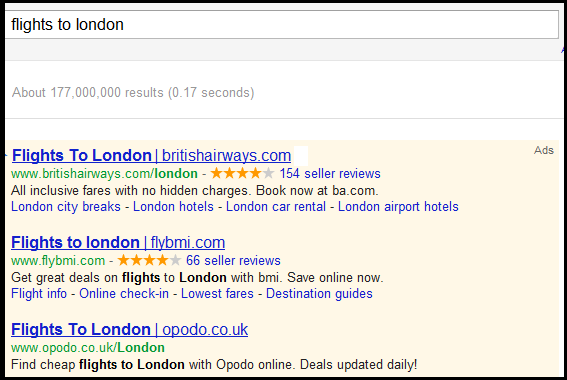Google Tweaks Quality Score in Favour Of Landing Pages
We’ve all seen, and in many cases demonstrated, the old QS graphic with each determinant in a an equal sized bubble, implying each is allocated equal weight. We also all know this to be cobblers with, in reality, clickthrough rate massively outweighing all the others.
While for the most part this is still going to be the case – Google is not going to start favouring ads with awesome landing pages that no-one ever clicks on – we can expect that it will be increasingly worth the effort to ensure landing pages relate as closely as possible to keywords, and vice versa.
Let’s look at an example:
All three of the adverts above are approximately equal in terms of relevance, with the search term included in the title of each. The BMI and Opodo ads include the term in the body copy as well, two have Google seller ratings, while British Airways probably has the stronger brand of the three. All of these are largely cosmetic and the major difference between the three advertisers lies in the landing page.
The British Airways advert links through to a page entitled flights to London, which contains plenty of relevant text-based content (readable by the search spiders) and a pre-populated booking fragment. The BMI ad is rather less relevant to the search, taking us to the BMI homepage rather than anywhere deeper. The Opodo ad delivers to a degree but there’s not a lot of relevant content there. The BA page is, essentially, one optimised with organic search best practice in mind and, at its simplest, this adjustment can really be seen as a closer alignment of the organic algorithm with that of paid search. A relevant page will make it easier to appear in the top spots and cheaper to do so if you’re already there.
How will this affect paid search strategies? Aside from clamping down on lazy agencies and mandating that their ads are already going through to the best existing page, the bigger spenders will probably look to expand their sites and build pages around their most profitable products or most expensive keywords. Smaller advertisers can play as well and we would expect them to do so to their strengths, focussing spend on product areas around which their sites are already tailored.
As advertisers we should welcome the change, as it rewards us for being good at what we do. However, as with any changes to Adwords, this one is not quite as altruistic as it seems. From Google’s point of view, the goal is to encourage user confidence in search ads: to click, to find what they were looking for, to return and to click again.



